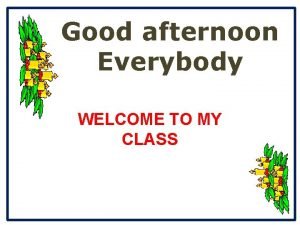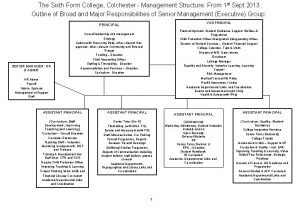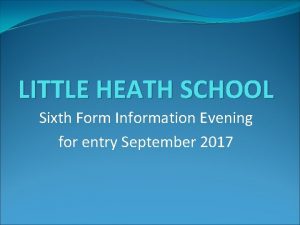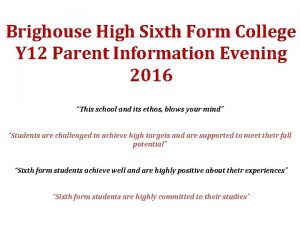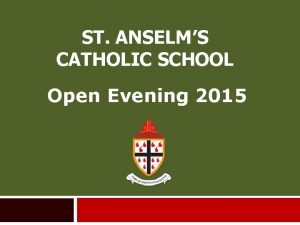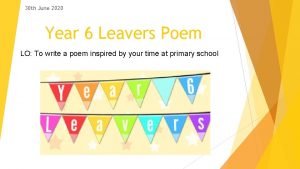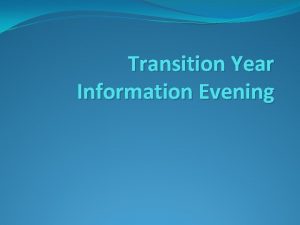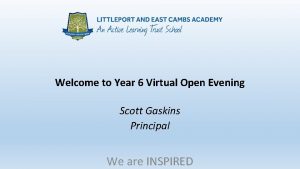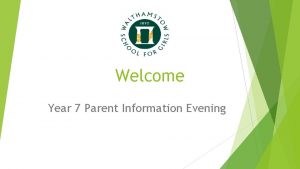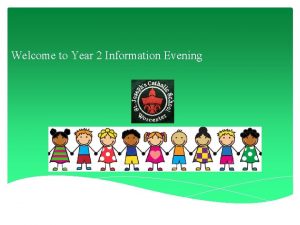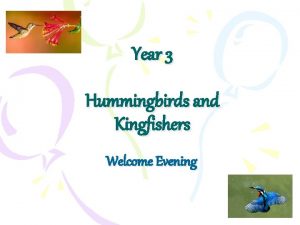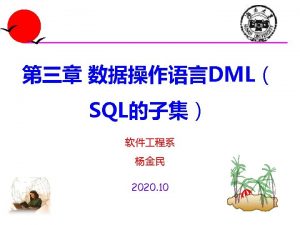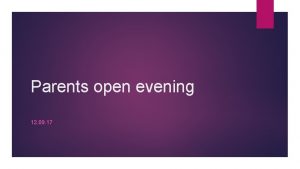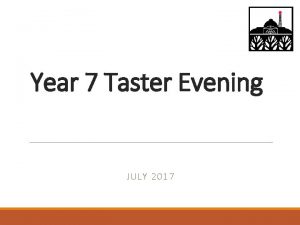Welcome to Year R Open Evening 2017 Staff
















- Slides: 16

Welcome to Year R Open Evening 2017

Staff In Year R Mrs Lowe Miss Croft

Our Routines Reading Books will be changed every Monday and each child will receive 2 books on a Monday. PE sessions are every Friday – please ensure PE kits are in school Home Learning – home learning challenge books, reading books.

Our Day to Day learning Within our school day we have a phonics session, a Maths session, an English session and a topic session. On a Tuesday the children take part in an RE session and a Music session with Mrs Lowe and Mrs Oral. Within the EYFS the children are given time to explore their own learning within the enhanced continuous provision. The continuous provision enhancements change week to enhance the learning focuses for the week. During their own learning within the continuous provision the children are improving their social interactions with each other EG: turn taking, sharing the limited resources available in each area, sharing their thoughts, ideas and feelings.

Reading Books Reading books are very important to share at home with your child as much as you can. The majority of the children are on non-worded books at the moment and will remain on non-worded books until your child begins to blend sounds together to say a word. Once you have shared the reading book at home with your child, please make a comment in the reading diary so we know how your child has enjoyed the reading book. If the reading record isn’t signed on a Monday the reading book won’t be changed. It is very important as we need to know they have shared their book at home with you.

Phonics Within phonics at this stage, we are learning our letter sounds. We are also beginning to blend the first 6 sounds (s, a, t, p, i, n) EG: at, in, pin. We make phonics fun by playing lots of different games to help us remember the sound. Robot Arms – this is a whole school approach to learning to segment and blend a word together. Please encourage children to do this at home when sounding out VC (two letter words) and CVC (three letter words).

Maths and English At this stage of the year Maths sessions are based around recognising numbers, using numbers and introducing the children to the Numicon we use to support our maths learning. In English, we are sharing lots of stories and encouraging the children to sequence key events from the stories. We also provide opportunities for the children to mark make.

What you can do at home Reading – share lots of stories at home as well as their reading books. Asking lots of questions about the story!! Phonics – continue to use the jolly phonics CD to learn the letter sounds. Maths – recognising numerals and assigning quantities to the numeral. Mark Making – encourage children to make marks (not just with a pencil and paper!!) this can be done in shaving foam, paint, sand, rice (get messy!!!)

E-Safety

How can children get online? • • PC laptops tablets (i. Pad etc) games consoles (Playstation, Wii, DS, Xbox) i. Pods e-readers smartphones smart TV/ blu-ray players

What could they be doing online? • • playing games talking to people (Skype) sharing information searching for information sending messages social networking making friends purchasing goods/ apps/ services

Risks children face online • • cyber-bullying accessing inappropriate websites losing control over images and videos they post viruses hacking of files grooming fines for using photos/ images without permission • slander or contempt of court for reposting tweets and posts

Tools to protect your children – Parental Control Every parental control package is different, but most provide services such as: Filtering – content to restrict access to particular sites Time limits – restrict the amount of time your child can be online, or set periods of time where your child can access certain sites

Monitoring – where you are informed of certain sites that your child is attempting to gain access to. Reporting – where you are provided with information about what sites your child has used.

Let them teach you The people who know best about what your children are up to online, are your children! Get them to tell you about the sites they’re using. Ask them questions such as: ◦Why do they like the site? ◦What can they do on it? ◦What’s so fun about it? ◦Who uses it at school? ◦Who you can talk to? ◦Who are their friends on it? This is a good way to develop a trusting relationship with your child about what they are up to online.

E-Safety ( Messages ) Your children may have their own mobile phone, email account or social network page, so it is important they know what to do when things go wrong. 1. Do not delete the message 2. Don’t show the message to other children 3. Go to a grown up to tell them, not a friend 4. Do not respond to any messages
 Year 7 information evening
Year 7 information evening Afternoon everybody
Afternoon everybody Open innovation open science open to the world
Open innovation open science open to the world Winchmore sixth form open evening
Winchmore sixth form open evening Colchester sixth form college open evening
Colchester sixth form college open evening Shenfield high school open evening
Shenfield high school open evening Little heath sixth form
Little heath sixth form Kesgrave 6th form
Kesgrave 6th form Parkside school open evening
Parkside school open evening Brighouse high school open evening
Brighouse high school open evening Hounsdown school open evening
Hounsdown school open evening Chesterton community college open evening
Chesterton community college open evening St anselms open evening
St anselms open evening Bushey meads open evening
Bushey meads open evening Poem for leavers assembly
Poem for leavers assembly Welcome to year 11
Welcome to year 11 Welcome to year 8
Welcome to year 8

